Jewish festival food is stodgy. I'm talking about the Eastern European preparations that I first delighted in as a small child at my great-grandmother's groaning table: noodle kugel as dense as cheesecake, a casserole of rice and potatoes bathed in chicken fat with the nondescriptive name "baked dish," massive matzo balls floating in chicken soup glistening with globs of golden fat. You can Atkins or South Beach all you want the rest of the year, but when those high holiday meals roll around, it's a safe bet that you'll be rolling too. There's nothing delicate about our delicacies, but there's plenty of flavor, texture, and gustatory satisfaction to celebrate.
In my previous life as a New Yorker, I was blessed with an abundance of perfectly prepared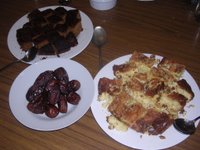 Jewish foods. If I didn't have a friend whipping up one of her grandmother's recipes and didn't feel like taking a crack at traditional cooking myself, I could simply jet over to Zabar's or Fairway for countless varieties of kugels, challahs, rugalach, bagels, knishes, or just about anything else I could want to satisfy the carb cravings instilled in my genes by generations of shtetl life. To eat those comforting Rosh Hashanah favorites in Adelaide, however, I was going to have to be a bit more resourceful. I felt up to the task, so I tackled it full on by inviting a handful of international friends to join me for the meal and offering up a quick prayer to the god-of-ingredient-bounty before heading off to the markets.
Jewish foods. If I didn't have a friend whipping up one of her grandmother's recipes and didn't feel like taking a crack at traditional cooking myself, I could simply jet over to Zabar's or Fairway for countless varieties of kugels, challahs, rugalach, bagels, knishes, or just about anything else I could want to satisfy the carb cravings instilled in my genes by generations of shtetl life. To eat those comforting Rosh Hashanah favorites in Adelaide, however, I was going to have to be a bit more resourceful. I felt up to the task, so I tackled it full on by inviting a handful of international friends to join me for the meal and offering up a quick prayer to the god-of-ingredient-bounty before heading off to the markets.
I designed my menu to reflect the intersection of Eastern European tradition with Middle Eastern influences that defines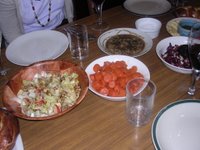 contemporary Jewish cooking. Since Adelaide possesses both a climate conveniently similar to that of the Mediterranean and a sizable population of German heritage in the nearby Barossa Valley, it was relatively easy to find most of the ingredients. Eggplants, beets, carrots, tahini, honey, dried fruits and spices, even artisanal egg noodles and sweet dates were easily procured at the Central Markets. I was disappointed, however, that I simply could not get a pomegranate in September in the Southern Hemisphere, so I had to settle for a syrupy derivative.
contemporary Jewish cooking. Since Adelaide possesses both a climate conveniently similar to that of the Mediterranean and a sizable population of German heritage in the nearby Barossa Valley, it was relatively easy to find most of the ingredients. Eggplants, beets, carrots, tahini, honey, dried fruits and spices, even artisanal egg noodles and sweet dates were easily procured at the Central Markets. I was disappointed, however, that I simply could not get a pomegranate in September in the Southern Hemisphere, so I had to settle for a syrupy derivative.
It was definitely the first Rosh Hashanah meal for many of my guests, hailing from Taiwan, Hong Kong, Ecuador, Ireland, Japan, Australia, Canada and the American midwest. They seemed to delight in the different tastes of the foods, though certainly not as much as I delighted in their delight. Eating Jewish food may require much more creativity here in Adelaide, but the gift of being able to share the traditional dishes that I love with people to whom the food is totally unfamiliar outweights the extra effort.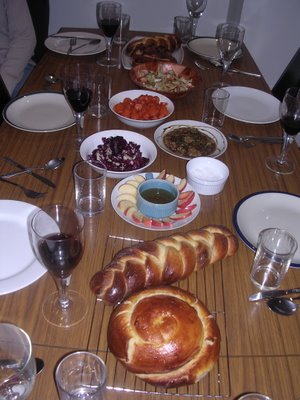
Just for fun...the Menu:
Challah
Apples and honey
Roasted beets with tahini
Apple and endive salad with honey mustard dressing
Carrot tzimmes
Roasted eggplant salad with pomegranate syrup
Whole roasted snapper
Beef roast with dried fruit
Grilled asparagus
Sweet noodle kugel
Honeycake
Dates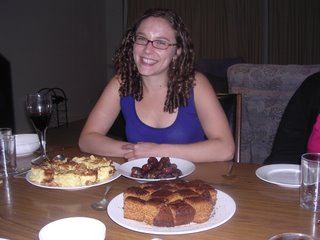
In my previous life as a New Yorker, I was blessed with an abundance of perfectly prepared
 Jewish foods. If I didn't have a friend whipping up one of her grandmother's recipes and didn't feel like taking a crack at traditional cooking myself, I could simply jet over to Zabar's or Fairway for countless varieties of kugels, challahs, rugalach, bagels, knishes, or just about anything else I could want to satisfy the carb cravings instilled in my genes by generations of shtetl life. To eat those comforting Rosh Hashanah favorites in Adelaide, however, I was going to have to be a bit more resourceful. I felt up to the task, so I tackled it full on by inviting a handful of international friends to join me for the meal and offering up a quick prayer to the god-of-ingredient-bounty before heading off to the markets.
Jewish foods. If I didn't have a friend whipping up one of her grandmother's recipes and didn't feel like taking a crack at traditional cooking myself, I could simply jet over to Zabar's or Fairway for countless varieties of kugels, challahs, rugalach, bagels, knishes, or just about anything else I could want to satisfy the carb cravings instilled in my genes by generations of shtetl life. To eat those comforting Rosh Hashanah favorites in Adelaide, however, I was going to have to be a bit more resourceful. I felt up to the task, so I tackled it full on by inviting a handful of international friends to join me for the meal and offering up a quick prayer to the god-of-ingredient-bounty before heading off to the markets.I designed my menu to reflect the intersection of Eastern European tradition with Middle Eastern influences that defines
 contemporary Jewish cooking. Since Adelaide possesses both a climate conveniently similar to that of the Mediterranean and a sizable population of German heritage in the nearby Barossa Valley, it was relatively easy to find most of the ingredients. Eggplants, beets, carrots, tahini, honey, dried fruits and spices, even artisanal egg noodles and sweet dates were easily procured at the Central Markets. I was disappointed, however, that I simply could not get a pomegranate in September in the Southern Hemisphere, so I had to settle for a syrupy derivative.
contemporary Jewish cooking. Since Adelaide possesses both a climate conveniently similar to that of the Mediterranean and a sizable population of German heritage in the nearby Barossa Valley, it was relatively easy to find most of the ingredients. Eggplants, beets, carrots, tahini, honey, dried fruits and spices, even artisanal egg noodles and sweet dates were easily procured at the Central Markets. I was disappointed, however, that I simply could not get a pomegranate in September in the Southern Hemisphere, so I had to settle for a syrupy derivative.Like balabustas of yore, the kitchen was my domain for days before the event. I baked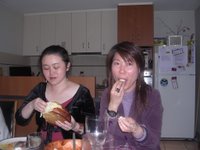 my honeycake, redolent of spices and speckled with bits of ginger, orange zest and sugar crystals, and let it mature wrapped in aluminum foil on my kitchen counter. Challah dough was kneaded, left to rise, kneaded, and left to rise again, beets and eggplants were roasted, and kugel was assembled and chilled overnight before baking. On the day of the meal, I finished up the final baking and assembling touches and traded my apron for a new top before my guests arrived.
my honeycake, redolent of spices and speckled with bits of ginger, orange zest and sugar crystals, and let it mature wrapped in aluminum foil on my kitchen counter. Challah dough was kneaded, left to rise, kneaded, and left to rise again, beets and eggplants were roasted, and kugel was assembled and chilled overnight before baking. On the day of the meal, I finished up the final baking and assembling touches and traded my apron for a new top before my guests arrived.
 my honeycake, redolent of spices and speckled with bits of ginger, orange zest and sugar crystals, and let it mature wrapped in aluminum foil on my kitchen counter. Challah dough was kneaded, left to rise, kneaded, and left to rise again, beets and eggplants were roasted, and kugel was assembled and chilled overnight before baking. On the day of the meal, I finished up the final baking and assembling touches and traded my apron for a new top before my guests arrived.
my honeycake, redolent of spices and speckled with bits of ginger, orange zest and sugar crystals, and let it mature wrapped in aluminum foil on my kitchen counter. Challah dough was kneaded, left to rise, kneaded, and left to rise again, beets and eggplants were roasted, and kugel was assembled and chilled overnight before baking. On the day of the meal, I finished up the final baking and assembling touches and traded my apron for a new top before my guests arrived.It was definitely the first Rosh Hashanah meal for many of my guests, hailing from Taiwan, Hong Kong, Ecuador, Ireland, Japan, Australia, Canada and the American midwest. They seemed to delight in the different tastes of the foods, though certainly not as much as I delighted in their delight. Eating Jewish food may require much more creativity here in Adelaide, but the gift of being able to share the traditional dishes that I love with people to whom the food is totally unfamiliar outweights the extra effort.

Just for fun...the Menu:
Challah
Apples and honey
Roasted beets with tahini
Apple and endive salad with honey mustard dressing
Carrot tzimmes
Roasted eggplant salad with pomegranate syrup
Whole roasted snapper
Beef roast with dried fruit
Grilled asparagus
Sweet noodle kugel
Honeycake
Dates



